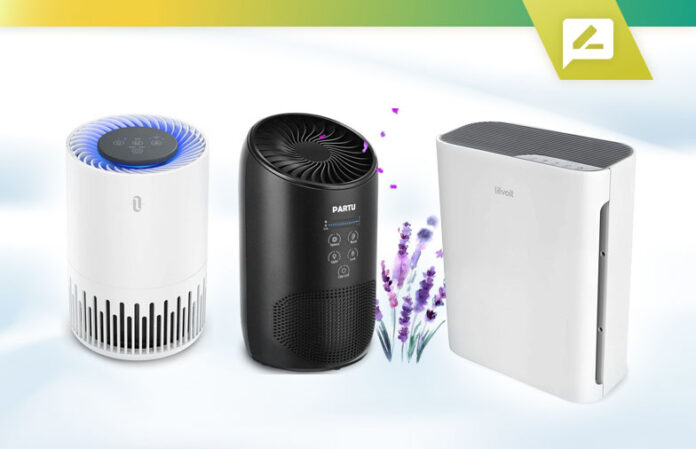Poor air quality leads to poor health. You breathe constantly, which means your body is constantly exposed to airborne pollutions.
Today, many people use air purifiers to cleanse the air. Air purifiers are affordable and effective. They filter toxins and pollutants from the air, giving you cleaner, healthier air to breathe.
Some people use air purifiers in specific rooms – like a bedroom. Others take air purifiers on-the-go when traveling or in hotel rooms.
No matter why you need an air purifier, you have plenty of options. Amazon sells top-rated air purifiers for $50 to $300. Whatever amount you want to spend, there’s an air purifier for you. With the uptick in demand and heightened sense of awareness about the quality of breathable air in the environment, the rise in healthy air products like ionizers, portable air conditioners, UV humidifiers and UV light sanitizers has been remarkable in 2024.
While there are many styles and types of air purification units to choose from, such as the IonPure plug-in air filter or the Blaux In Home Air Purifier unit, today we’re highlighting the best air purifiers of 2024; including the air purifiers, air filters, HEPA systems, and other tools to cleanse the air you breathe.
Ranking the Top 23 Best Air Purifiers in 2024
All air purifiers claim to cleanse the air and remove toxins. However, no two air purifiers are the same. Our editorial team analyzed the best air purifiers on the market to create the following rankings:
Contents
TaoTronics HEPA Air Purifier
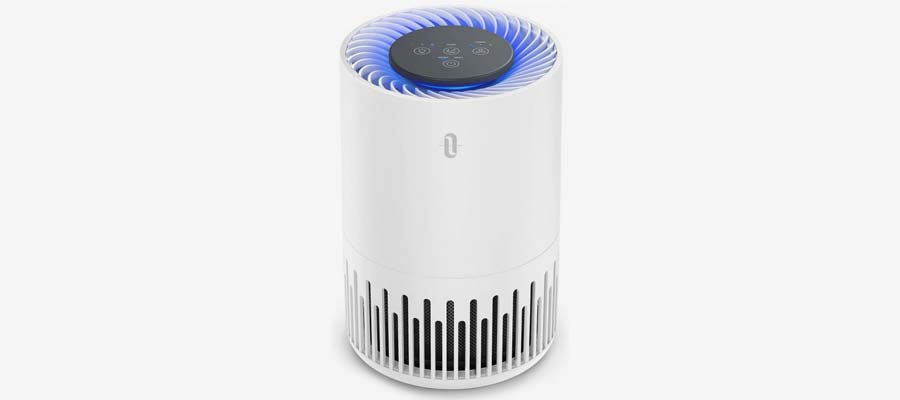
The TaoTronics HEPA Air Purifier is one of the best-selling air purifiers on Amazon. It’s small, portable, and affordable, giving you effective air purification anywhere in your home. TaoTronics claims their air purifier can handle smoke, pollen, pet dander, hair, and more. The unit uses a 3-stage filtration system (pre-filter, activated carbon, and true HEPA) to cleanse 99.97% of contaminants as small as 0.3 microns from the air.
TaoTronics also claims their air purifier is effective for use against odors, dust, and mold. Plus, the stylish white or black design makes it ideal for use in the bedroom, office, or anywhere else. It looks more like a smart device than an air purifier. And, at $80, it’s surprisingly affordable.
Price: $80
Get TaoTronics HEPA Air Purifier on Amazon
PARTU HEPA Air Purifier
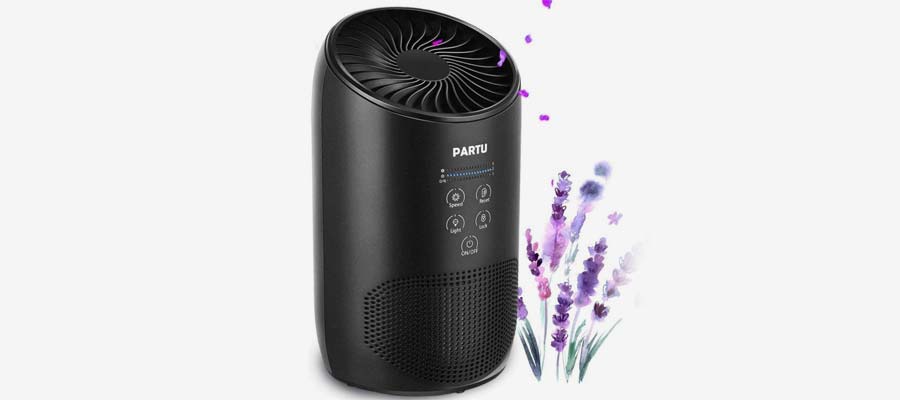
The PARTU HEPA Air Purifier is an ozone-free air filtration system that eliminates smoke, dust, pollen, and pet dander. At under $50, it’s one of the most cost-effective air purifiers on this list. It uses a three-stage filtration system with a pre-filter, HEPA filter, and activated carbon filter. The system captures dust, pollen, smoke, odor, and pet dander. It’s capable of filtering particles as small as 0.3 microns and air pollution of PM 2.5.
The PARTU HEPA Air Purifier also has a feature we don’t see on other units: a fragrance sponge. Add a drop of essential oil (not included) to the sponge, and it spreads scented air throughout your home.
Price: $50
Get PARTU HEPA Air Purifier on Amazon
LEVOIT Air Purifier for Home
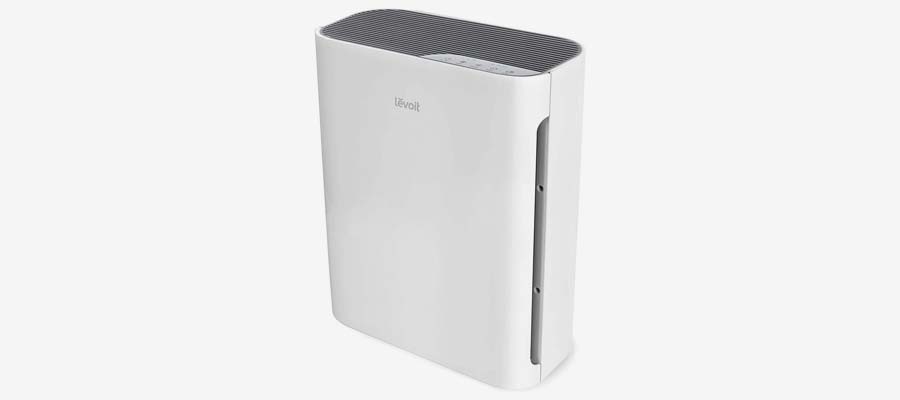
LEVOIT’s Air Purifier for Home comes with an H13 True HEPA filter, making it ideal for those with allergies, pets, mold or pollen issues, dust, and other indoor air hazards. The air filter comes with a washable pre-filter that captures large particles like hair, pet fur, and lint, while the interior filters capture 99.97% of contaminants 0.3 microns in size.
At $120, the LEVOIT Air Purifier for Home isn’t the cheapest air purifier on this list. However, it offers good value and a stylish design. Plus, you can buy a 2-pack for $230, reducing the cost per unit substantially.
Price: $120
Get LEVOIT Air Purifier for Home on Amazon
RIGOGLIOSO True HEPA Filter Air Purifier
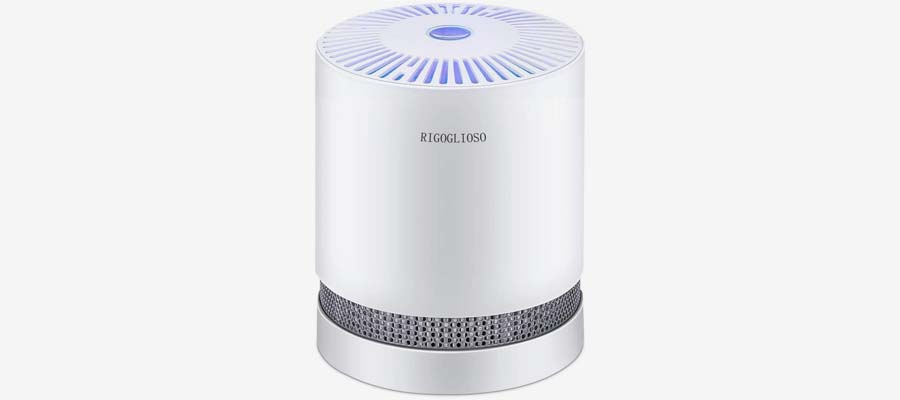
The RIGOGLIOSO True HEPA Filter Air Purifier filters 99.97% of dust, pollen, smoke, pet dander, pet hair, mold, odor, large dust particles, and more. The filter is marketed towards anyone who appreciates clean air, including pet owners, parents, and anyone else.
At $60 per unit, the RIGOGLIOSO air purifier provides effective performance without breaking the bank. It also comes with 3 speed settings, an ozone-free design, and a portable size, making it ideal to carry between rooms in your home.
Price: $60
Get RIGOGLIOSO True HEPA Filter Air Purifier on Amazon
LEVOIT Air Purifier for Home Bedroom
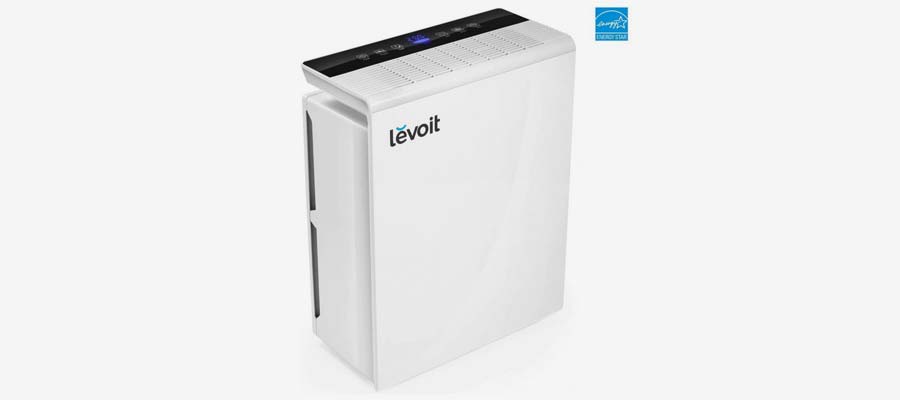
The LEVOIT Air Purifier for Home Bedroom has an H13 True HEPA filter. It’s a higher-priced, higher-end unit than the LEVOIT unit mentioned above. At $180 and with higher power, the LEVOIT Air Purifier for Home Bedroom is ideal for medium and larger-sized rooms.
The LEVOIT Air Purifier for Home Bedroom removes up to 99.97% of harmful germs, dust, pollen, pet dander, mold spores, and other allergens as small as 0.3 microns from the air. It’s marketed towards those with allergies, asthma, stuffy nose, or anyone who wants fresher, cleaner air.
Price: $180
Get LEVOIT Air Purifier for Home Bedroom on Amazon
AZEUS High CADR Air Purifier
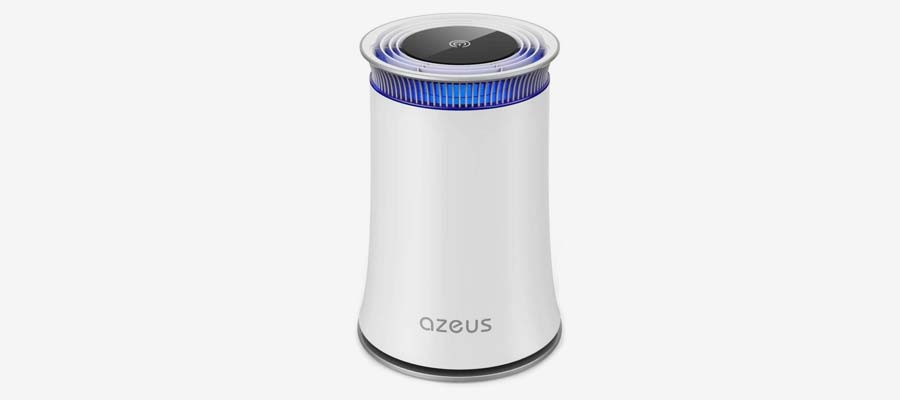
The AZEUS High CADR Air Purifier is a smaller air purifier capable of cleansing air in rooms up to 380 square feet. It contains a True HEPA filter that removes allergens, pollen, smoke, dust, pet dander, and more.
The AZEUS air filter removes 99.97% of contaminants and comes with 3 adjustable fan speeds. You press one button to turn the unit on and adjust fan speeds. It’s a simple air purifier that comes in a stylish, futuristic-looking package.
Price: $75
Get AZEUS High CADR Air Purifier on Amazon
KOIOS Air Purifier
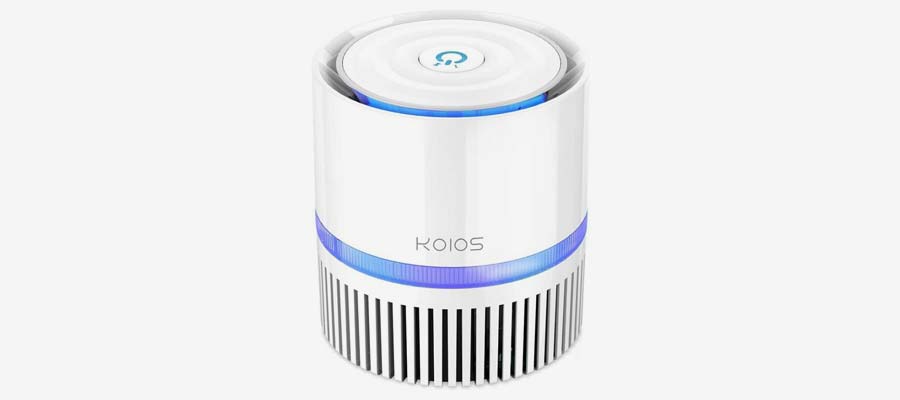
The KOIOS Air Purifier is a 3-in-1 True HEPA filter that eliminates odor, smoke, dust, allergens, pet dander, and more. Like most other air filters here, the KOIOS Air Purifier filters 99.97% of dust, pollen, mold spores, and pet dander, including particles as small as 0.3 microns and air pollution of PM2.5.
At $50, the KOIOS Air Purifier provides effective air purification for small spaces without breaking the bank. It’s also surprisingly quiet: it has a noise-reducing blade design that runs at just 25 decibels. You can run it in your bedroom overnight without interrupting sleep.
Price: $50
Get KOIOS Air Purifier on Amazon
JINPUS Air Purifier
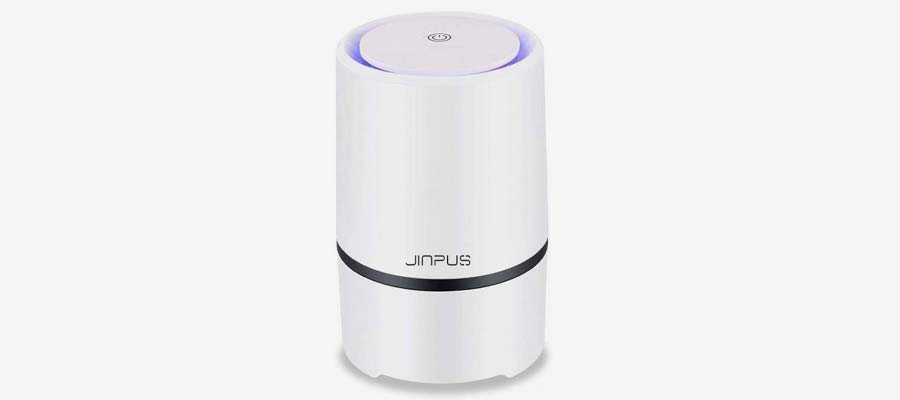
The JINPUS Air Purifier is a small air cleaner for the home. The unit comes with a HEPA filter. At $40, it’s one of the most affordable air purifiers listed here. JINPUS emphasizes a quiet design, 360 degree purification power, and UV-C light radiation to minimize bacteria. The unit comes with a one-touch, blue LED light switch.
JINPUS recommends replacing the filter every 6 months (the filter is not washable). You can buy new filters through Amazon and other retailers. If you want a high-end air purifier capable of cleaning large rooms, the JINPUS Air Purifier is not the right choice. If you want a basic air filter for small rooms, then the JINPUS Air Purifier may be the right choice.
Price: $40
Get JINPUS Air Purifier on Amazon
LEVOIT Air Purifier for Bedroom
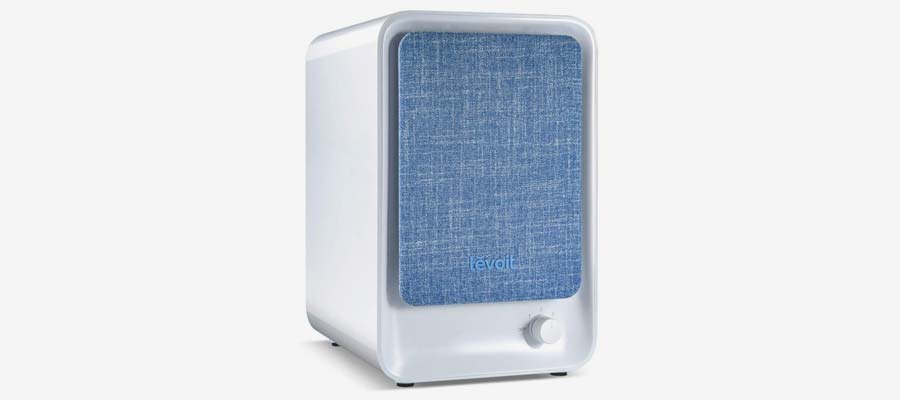
LEVOIT makes several best-selling air purifiers. The LEVOIT Air Purifier for Bedroom has a unique design, although it works similar to other mid-range air purifiers on this list. The unit features a 3-stage filtration system with a charcoal foam pre-filter, a True HEPA filter, and an activated carbon filter. Together, these three layers filter 99.9% of smoke, dust, pet dander, pollen, lint, mold, microbes, VOCs, and other particles from the air, down to 0.3 microns.
Like other cheaper air purifiers, the LEVOIT Air Purifier for Bedroom cleans areas up to 160 square feet, making it ideal for smaller rooms – like a bedroom or office – but less appropriate for larger areas or rooms.
Price: $60
Get LEVOIT Air Purifier for Bedroom on Amazon
RabbitAir MinusA2
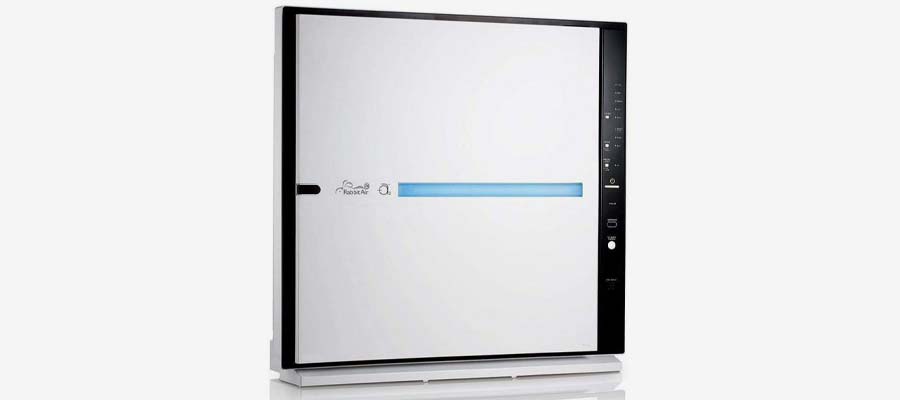
The RabbitAir MinusA2 is an ultra-quiet HEPA air purifier that aims to be stylish and energy efficient. With 1,200+ reviews on Amazon and an average rating of 4.6 stars out of 5, the RabbitAir MinusA2 is one of Amazon’s most popular air purifiers.
At $550, the RabbitAir MinusA2 is one of the most expensive air purifiers on this list. It’s also one of the most unique-looking air filters on this list. You install the unit on the wall, then control it via a remote control. If you want a portable, cheaper air conditioner, then the RabbitAir MinusA2 isn’t a good choice. If you want high-end filtration with a wall-mounted design, however, then the RabbitAir MinusA2 is one of the best available.
Price: $550
Get RabbitAir MinusA2 on Amazon
Germ Guardian True HEPA Filter Air Purifier
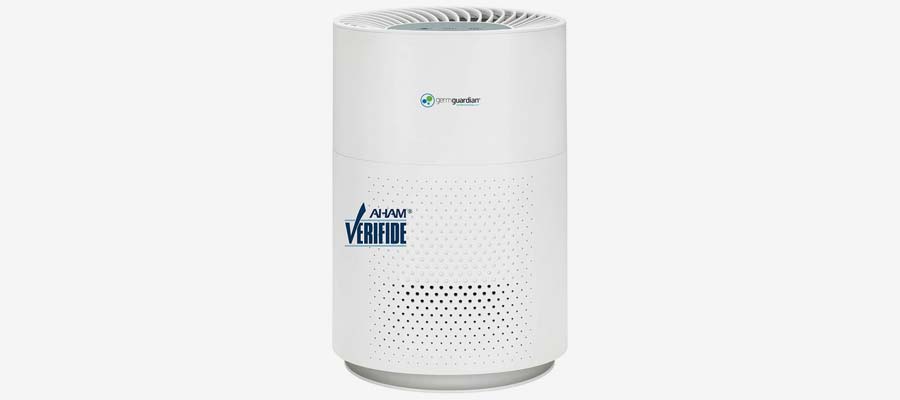
The Germ Guardian True HEPA Filter Air Purifier is an air purifier for home, office, bedrooms, and more. The unit deodorizes and filters particles, removing allergens, pollen, smoke, dust, pet dander, mold, and more. The Germ Guardian air purifier uses activated charcoal and a True HEPA filter to trap particles in the air.
The Germ Guardian is 13.5 inches tall and can easily be carried between rooms. Just carry the unit and plug it in wherever you need cleaner air. There’s also a sleep mode with an ultra-quiet speed setting.
Price: $80
Get Germ Guardian True HEPA Filter Air Purifier on Amazon
Blueair Blue Pure 411+
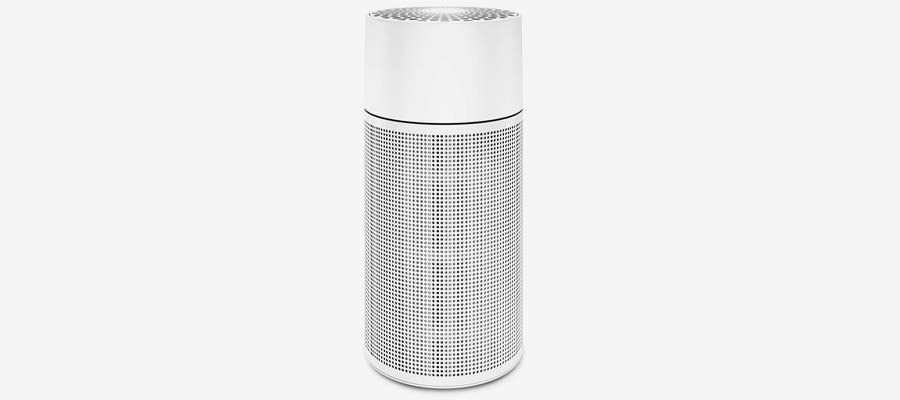
The Blueair Blue Pure 411+ is a popular and well-rated air purifier with 1,100+ reviews and an average rating of 4.3 stars out of 5. The unit captures allergens, odors, smoke, mold dust, germs, and more. As with most other filters on this list, the Blueair Blue Pure 411+ can easily be carried between rooms to wherever you need clean air.
There are two versions of the Blue Pure air filter, including the Blue Pure 411 and the Blue Pure 411+. At $140 per air filter, the unit has a mid-range price for high-end performance. You can also customize the air filter with 6 pre-filter color options (or leave the white mesh frame for a minimalistic look).
Price: $140
Get Blueair Blue Pure 411+ on Amazon
Alen BreatheSmart FLEX Air Purifier
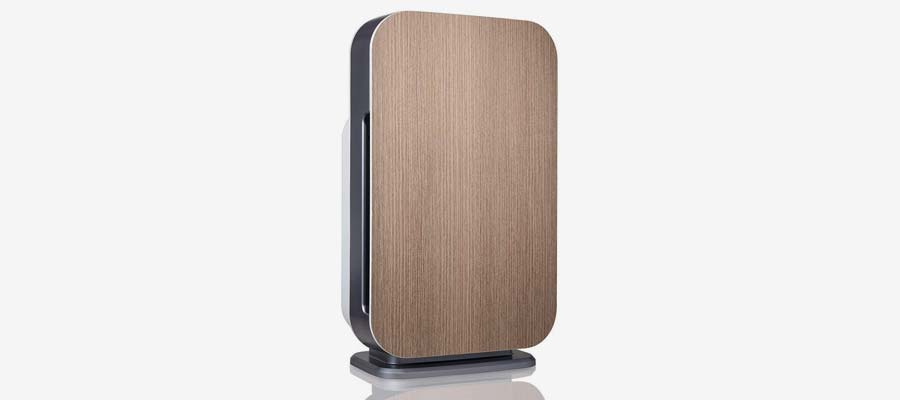
The Alen BreatheSmart FLEX Air Purifier cleans rooms up to 700 square feet. At $212, it’s surprisingly stylish with multiple colors available. It has unique colors like oak, rosewood, espresso, brushed stainless, weathered gray, and more.
There are two versions of the air filter, including one version for dust, mold, and pet odors and another version for dust, mold, pet odors, and smoke. There are 4 different speeds available, including a ‘pink noise’ frequency for quiet operation at night.
Price: $212
Get Alen BreatheSmart FLEX Air Purifier on Amazon
Hamilton Beach TrueAir Air Purifier
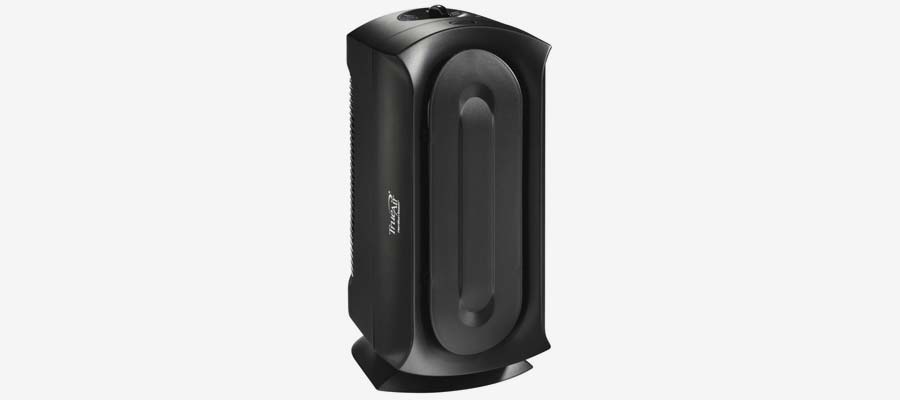
Hamilton Beach is a well-known appliance brand. The company makes a Hamilton Beach TrueAir Air Purifier with a permanent HEPA filter for allergens, and pets. At $50, it’s an affordable air purifier with a basic design.
The Hamilton Beach TrueAir Air Purifier captures 99% of pet dander, dust, dust mites, pollen, and mold or mildew spores as small as 3 microns from the air. It cleans rooms up to 160 square feet – making it ideal for offices or bedrooms but less suited for larger rooms. If you want a basic air filter from a trusted brand, then the Hamilton Beach TrueAir Air Purifier is a leading option. It’s also the most-reviewed air purifier on this list (5,000+ reviews and average rating of 4.4 stars out of 5 on Amazon).
Price: $50
Get Hamilton Beach TrueAir Air Purifier on Amazon
WAGNER Switzerland Air Purifier WA777
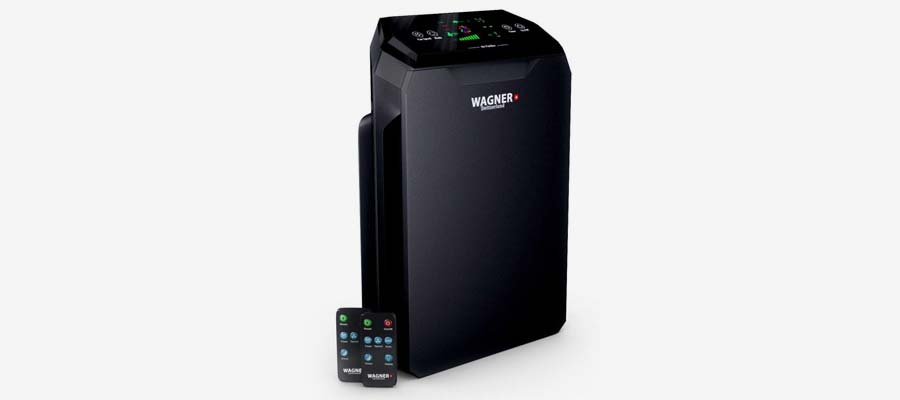
The WAGNER Switzerland Air Purifier is a HEPA-13 medical-grade air purification system with automatic air quality detection and other nifty features. The unit removes 99.95% of particles from the air using a pre-filter, HEPA-13 filter, activated carbon, and cold catalyst filter. These filters remove particles as small as 0.1 micron, including smoke, pollen, bacteria, germs, pet dander, and more.
At $160, the WAGNER WA777 is more expensive than many other options on this list, yet it offers more effective air filtration. It’s effective in rooms up to 500 square feet in size and has been proven to refresh the air in just 10 minutes. The unit also reads the room using the i-Sense detection system, giving you instant feedback on your air quality.
Price: $160
Get WAGNER Switzerland Air Purifier WA777 on Amazon
HoMedics Total Clean
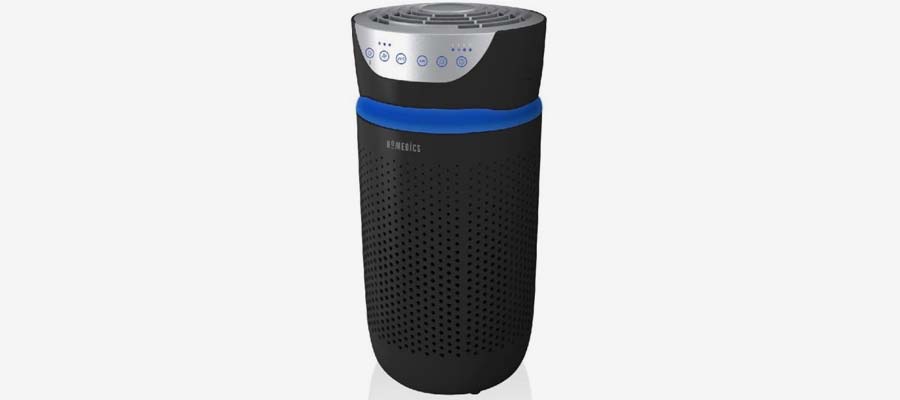
The HoMedics TotalClean is a 5-in-1 air purifier with 360-degree HEPA filtration, 3 speeds, a pre-filter, and an auto-off timer, among other features. At $140, it’s more expensive than other filters, although it also has a UV-C light for extra bacteria and virus-killing potential. The True HEPA filter eliminates dust, mold spores, pet dander, and more.
HoMedics sells two versions of its unit, including a small room and medium room option. Like other filters here, it removes up to 99.9% of airborne allergens as small as 2 microns, while a built-in carbon filter reduces odor and VOCs.
Price: $140
Get HoMedics Total Clean on Amazon
Airthereal APH260 Air Purifier
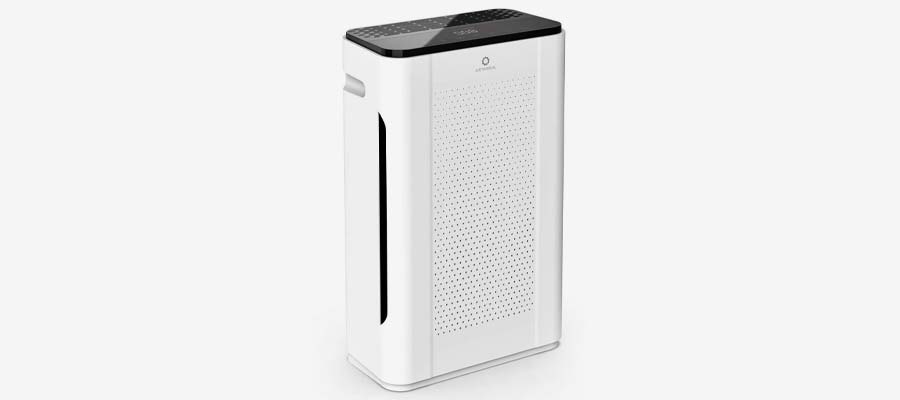
The Airthereal APH260 Air Purifier is an air purifier for large rooms and offices. It comes with a 3-stage filtration system, including a pre-filter, a True HEPA filter, and an activated carbon filter (with nano mineral, cold catalyst filter, photo catalyst filter, and molecular sieve attached). The system claims to remove airborne particles as small as 0.3 microns.
The system has a smart control system that automatically measures air quality, then changes filtration based on the analysis. The Airthereal APH260 Air Purifier will start flashing when you need to replace the filter. You can use it for living rooms, bedrooms, offices, restaurants, hotels, labs, and more.
Price: $130
Get Airthereal APH260 Air Purifier on Amazon
Zeppoli Air Purifier for Home
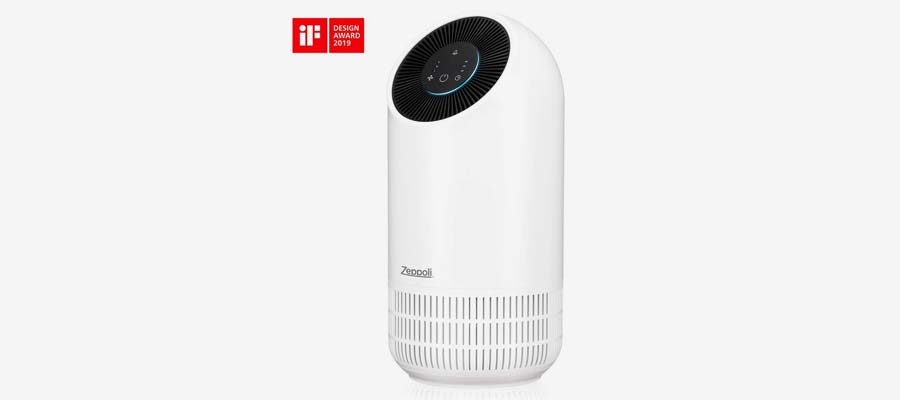
The Zeppoli Air Purifier for Home is an air filtration system that cleans pet hair, odor, dander, allergies, and other germs. At $60, it’s an affordably-priced air filter capable of cleansing air in smaller rooms – like a bedroom or office.
Each unit contains a True HEPA filter to trap fine particles like dander, dust mites, pollen, and other allergens. Overall, Zeppoli claims the unit captures 99.7% of dust, allergens, pollen, pet dander, smoke, mold, and odor. The front of the unit has a power indicator light that flashes red. When it flashes, it’s time to replace your filter.
Price: $60
Get Zeppoli Air Purifier for Home on Amazon
InvisiClean Sensa Air Purifier
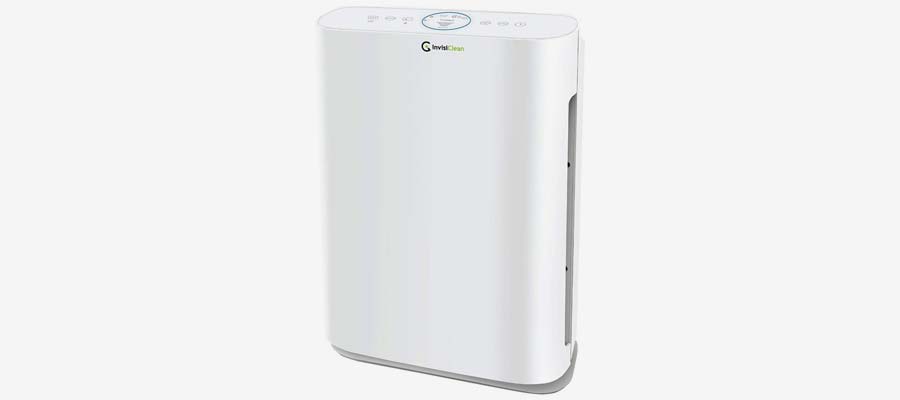
The InvisiClean Sensa Air purifier is a $150 air filtration system that offers medical-grade cleaning with a multi-stage filtration system. The H13 True HEPA filter cleans 99.985% of airborne particles as small as 0.3 microns and 99.91% of airborne particles as small as 0.1 microns.
The filter eliminates viruses, bacteria, allergens, mold, pet dander, dust mites, and more. It can remove small and large particles, odors, and more from the air. Plus, the InvisiClean Sensa Air Purifier has a PM2.5 sensor that measures and detects changes in air quality, then automatically runs based on the analyzed air quality.
Price: $150
Get InvisiClean Sensa Air Purifier on Amazon
Miko Air Purifier for Home Air Filtration
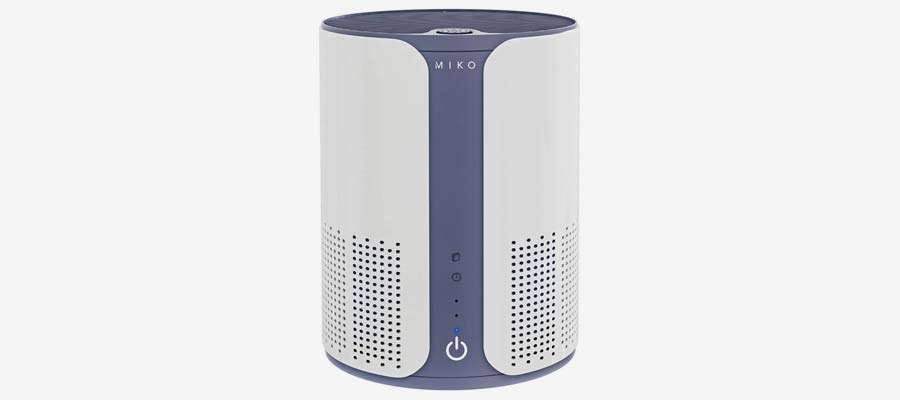
The Miko Air Purifier for Home Air Filtration features 3 fan speed settings, a preliminary filter, an anti-bacterial filter, and a True HEPA filter. It also has features like a built-in timer, suction system, and essential oil amplifier.
With a 25 decibel quiet mode, the Miko Air Purifier is ideal for use while sleeping. The higher fan speeds, meanwhile, can cleanse rooms up to 400 square feet with noise of under 46 decibels. The unit uses just 25 watts of power, making it a high-powered, energy efficient air purifier for use in any setting.
Price: $80
Get Miko Air Purifier for Home Air Filtration on Amazon
MOAOO Plug-in Air Purifier
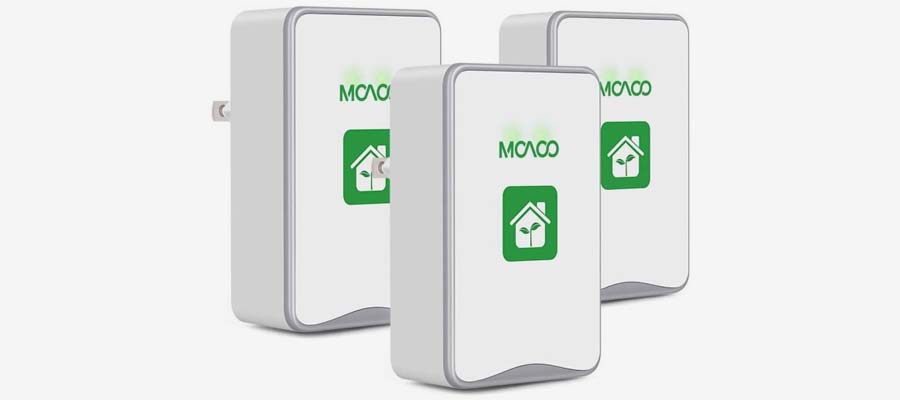
MOAOO Plug-in Air Purifier is the cheapest option on this list. At $18, it provides basic air purification at a ridiculously affordable price. You plug it into an ordinary electrical socket, and the MOAOO Plug-in Air Purifier removes smoke, dust, and odor via an ionization system.
If you want high-powered air purification, then the MOAOO Plug-in Air Purifier is not the right choice. It’s not big enough to cleanse an entire room from top to bottom. However, if you want basic purification at an affordable price, then the MOAOO Plug-in Air Purifier is one option (you can also buy a 3-pack for $46 to drop the cost even further).
Price: $18
Get MOAOO Plug-in Air Purifier on Amazon
VEVA 8000 Elite Pro Series Air Purifier
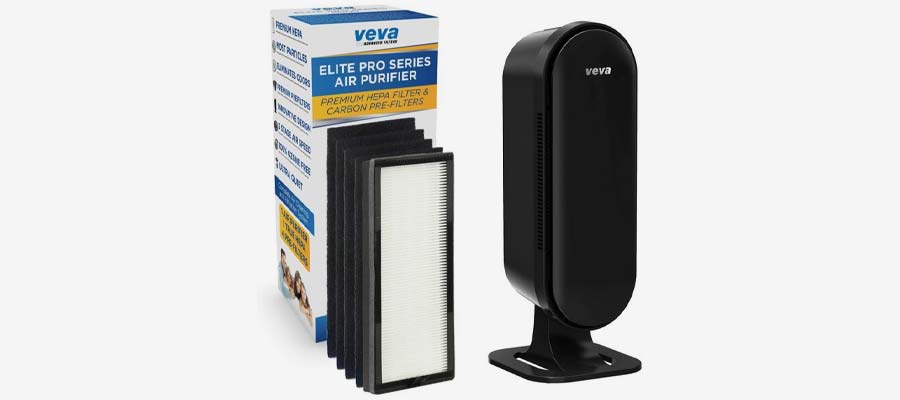
The VEVA 8000 Elite Pro Series Air Purifier has a dramatic name, although it provides effective air filtration for under $100. The unit has a HEPA filter that captures dust and allergens as small as 0.3 microns, removing household dust, pet dander, mold spores, pollen, bacteria, germs, and PM2.5 particles.
With 1,500+ Amazon reviews, the VEVA 8000 has an average rating of 4.5 stars out of 5, making it one of the top-rated options on this list. It cleans rooms up to 300 square feet, making it ideal for small or medium-sized environments.
Price: $100
Get VEVA 8000 Elite Pro Series Air Purifier on Amazon
Vremi Premium Large Room Air Purifier
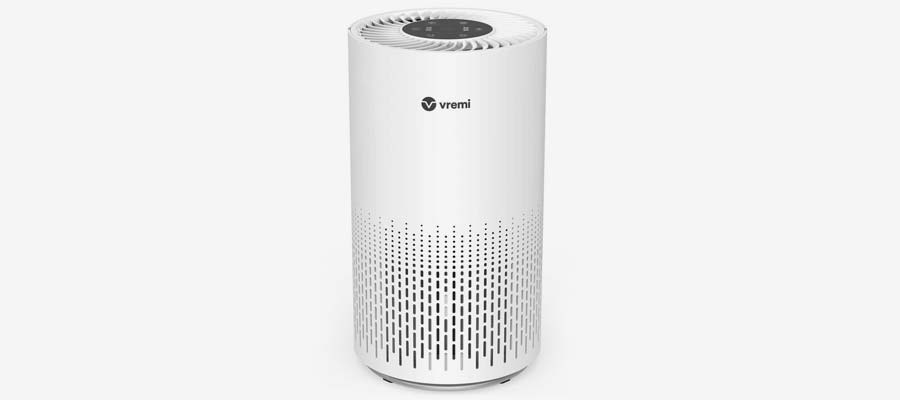
The Vremi Premium Large Room Air Purifier has a True HEPA H13 filter that purifies air in spaces up to 220 square feet. Priced at $110, the Vremi air purifier is an effective middle ground between the high-end and low-end models listed here. It covers small and medium-sized rooms with 3-stage filtration, including an ultra-fine pre-filter, a True HEPA filter, and an activated carbon filter.
The filter also has a gentle night lamp for use during sleep. It claims to be quiet at 52 decibels during operation, although that’s louder than many other units listed here. The Vremi air purifier has a 2-hour, 4-hour, and 8-hour timer.
Price: $110
Get Vremi Premium Large Room Air Purifier on Amazon
How We Ranked
All air purifier companies make similar claims. Here are some of the ranking factors we used to separate good and bad air purifiers:
True HEPA: True HEPA air purifiers are the industry standard. A True HEPA Air purifier captures up to 99.97% of particles as small as 0.3 microns, including a range of allergens and odors. We preferred air purifiers with True HEPA filtration (instead of the inferior HEPA Type filters and other filters). Some units also contained Medical Grade HEPA filters, which are better than True HEPA for air purification.
Purification System: Some air purifiers use a basic filter. Others contain a multi-stage filter with HEPA, activated carbon, and other systems. You’re buying an air purifier to purify the air, so we emphasized effective purification above all other factors.
Area Coverage: Low-end air purifiers (under $60) typically cover rooms 100 to 200 square feet, making them ideal for use on a nightstand or desk in small settings. Higher-end air purifiers could cover an entire apartment or home.
Purification Rating: Does the filter claims to clean 99.97% of pollutants in the air? Does it claim to remove particles as small as 0.1 microns? The more statistics the air purifier can release to verify its effectiveness, the more we like it.
Price & Value: Some people want to spend $50 on an air purifier. Others want to spend $5,000. We featured a range of purifiers for all prices, although we emphasized good value at every price. Nobody wants to get ripped off.
Noise: Most people don’t want a loud air purifier. Good air purifiers have multiple settings – including a night mode for quiet operation while you sleep.
Maintenance Requirements: Some air purifiers are extremely effective, yet they require extensive maintenance that limits their effectiveness or increases your costs.
Brand Reputation: Some air purifier brands have a long reputation of building quality products. Other air purifier brands are less reputable. Some air purifiers are made for under $5 at a factory in China then sold online at inflated prices. We emphasized proven air purifiers from reputable, trusted brands.
Energy Efficiency: Some air purifiers are wasteful. They burn excessive amounts of electricity. Others are Energy Star-rated by the EPA, which means they run effectively without wasting electricity or money.
Advertised Benefits: Some air purifier manufacturers are dramatic about their advertised benefits. They claim the units improve your health significantly, for example, or rejuvenate your body. Yes, clean air is good for you – but it’s not guaranteed to improve your health.
Usability and Control: Some air purifiers have remote controls. Others have one-button designs. We preferred air purifiers that were easy to use and control.
Warranty: Does the air purifier company stand behind its products with a long and thorough warranty? Or does the product have a limited warranty?
Other Features: Some air purifiers have smart features, Wi-Fi connectivity, automatic air quality sensors, multiple fan speeds, quiet modes, and other useful features. We considered all of these features when analyzing air purifiers.
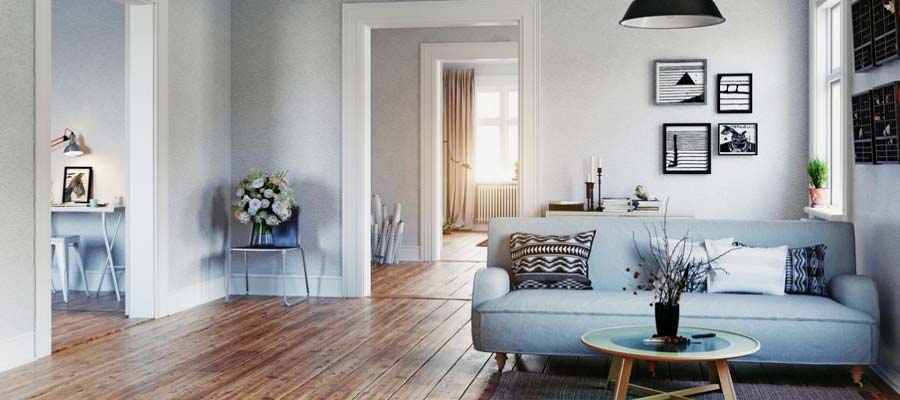
Who Should Use an Air Purifier?
Some people use air purifiers because they have health problems. You might have asthma or other breathing sensitivities, for example, making it difficult to breathe polluted air.
Others use air purifiers because they live in a polluted city. Certain metro areas have poor air quality. You breathe this air all day – even when inside. An air purifier reduces toxins and pollutants in the air, making it easier to breathe.
Some people use air purifiers because they prefer clean, healthy air. They don’t like unusual smells in the air, for example, and want their homes to feel clean and pure.
Air purifiers can be found in homes and offices. They can be found in bedrooms, living rooms, kitchens, and other areas of the home.
Some buy air purifiers for use in multiple rooms. You might have one air purifier for your bedroom, for example, and another air purifier for your office. Others carry an air purifier throughout the home.
Air purifiers can remove smoke from the air. Maybe you smoke inside. Maybe someone in your house smokes outside but brings cigarette smoke inside. Maybe you don’t like the smell of cigarette smoke. Maybe it’s wildfire season and you want to limit the spread of smoke within your home. Air purifiers can be particularly effective against smoke.
Do you live in a humid climate? Does your home smell musty or moldy? You might be at-risk for mold. Many air purifiers claim to specifically target mold, reducing the chance of a mold infestation.
Some people have chemical sensitivities. Some air purifiers are specifically labeled for multiple chemical sensitivities (MCS). If you are sensitive to odors, chemicals, household cleaning agents, and similar materials, then you might benefit from an air purifier.
Air purifiers are also popular among pet owners. If you own one or more pets, then your home might develop unusual smells. Air purifiers target and capture pet dander and odors, making your home smell fresher and cleaner.
Or, you may have allergies. Some air purifiers are specifically designed for allergy relief.
Benefits of Air Purifiers
Air purifiers have a proven ability to cleanse the air. A good air purifier makes the air cleaner and healthier.
Good air purifiers are backed by real science – not junk science. Some air purifiers make ridiculous claims about their effectiveness, while others back up these claims with proven scientific studies.
Many of the air filters above use HEPA filtration. HEPA stands for High Efficiency Particulate Air. The United States Department of Energy created the HEPA standard during the 1940s. It was originally designed to track and prevent air pollution linked to nuclear testing. Over the years, the HEPA standard has entered the consumer market, and it’s now common to rank air purifiers based on HEPA.
To meet HEPA standards, the filter must remove 99.97% or more of all particles that are 0.3 microns (micrometers) in diameter. That means for every 1,000 particles that are 0.3 microns in diameter, only 3 particles will pass through the filter.
For perspective, human hair is approximately 80 to 100 microns in diameter. When a filter removes particles that are 0.1 to 0.3 microns, it’s removing extremely fine particles from the air.
It’s important to note that there aren’t different types of HEPA. Filters are either HEPA or not. They either meet HEPA standards or fail those standards. There are however, different levels of HEPA efficiency.
HEPA ranks filters on an H10 to H14 scale, with H14 being the highest efficiency.
Based on the rating, HEPA filters fall into three categories, including the ultra-powerful Medical Grade HEPA, the effective True HEPA, and the lower-end HEPA Like filters:
Medical Grade HEPA: Medical Grade HEPA filters are the highest tier of HEPA filtration. They’re rated H13-H14. They’re considered medical-grade filters that remove more particles than lower-ranked filtration systems. H13 and H14 HEPA filters trap 99.95% and 99.995% of particles 0.1 microns in diameter. These filters are used in drug manufacturing settings, medical environments, and more.
True HEPA: Most consumer-grade air purifiers are True HEPA filters ranging from H10 to H12. These filters remove 85 to 99.5% of all particles that are 0.1 microns in diameter.
HEPA Type or HEPA Like: HEPA Type and HEPA Like filters are misleading labels. These filters do not meet HEPA standards. In fact, the HEPA Type and HEPA Like labels are meaningless. They intentionally mislead consumers, tricking them into believing the filters meet certain quality standards when that’s not the case.
What makes one filter better than another? Why are some filters more efficient than others? What’s the difference between an H14 HEPA filter and a lower-rated filter?
Essentially, the difference comes down to the web of fibers within the filter. A Medical Grade HEPA filter has a denser network of fibers, which means it blocks more particles from passing through the filter.
Overall, Medical Grade HEPA filtration is important for some settings, although True HEPA is fine for standard home settings. Some consumers are willing to pay for Medical Grade HEPA filtration, although True HEPA filtration is fine for most settings.
Bad-quality air is bad for your health. Pollutants like smoke from tobacco, wood burning, and cooking, for example, can all affect your health. Many homes are filled with gases or chemicals from cleaning products, paint, building materials, and more. Other homes have dust mites, mold, and pet dander. All of these things contribute to an unhealthy indoor environment that can harm the health of any living creature in your home – including humans, pets, plants, and more.
Smaller particles are particularly bad for your health. Fine particles that are 10 microns (micrometers) in diameter or smaller can lodge themselves deep within your lungs. Dust and smoke particles are particularly problematic due to their size. Breathing in particles of this size for a few hours or days can aggravate lungs and cause asthma attacks. In some, it can even cause heart attacks – say, if you’re at-risk for heart disease already.
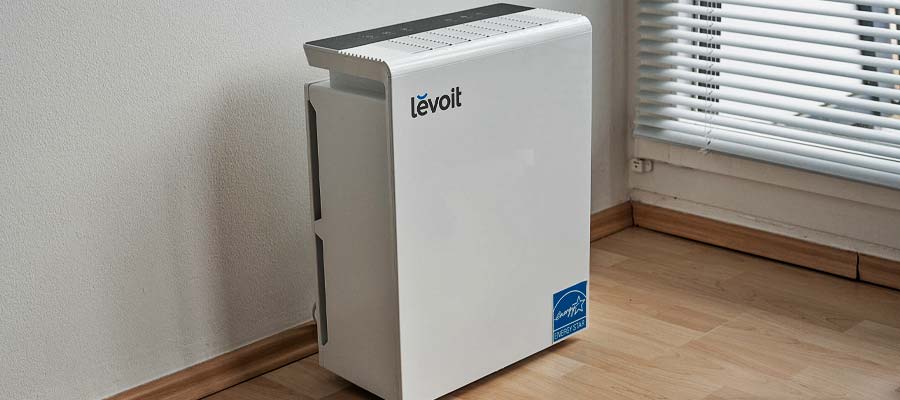
EPA guidelines state that long-term exposure to high particle levels is linked to bronchitis, reduced lung function, premature death, and other health issues.
Many air purifiers target VOCs, which are volatile organic compounds. These include compounds like formaldehyde released into the air from paint, building materials, adhesives, cleaning products, and other common household items. Once in the air, VOCs can cause throat and eye irritation, headaches, nausea, and organ damage. Long-term or serious VOC exposure can cause kidney and liver damage, nervous system issues, and more. The worst VOCs – including gasses like radon – cause lung cancer and death.
Do air purifiers actually work? Do scientific studies support the benefits of air purifiers? Can air purifiers really cleanse toxins from the air? Let’s take a closer look at what science says.
Researchers have performed hundreds of studies on air purifiers around the world. Good air purifiers are proven to reduce the risk of illness and improve health, although bad air purifiers may have limited practical benefits.
This 2015 study by researchers in Vancouver, for example, assessed the health benefits of HEPA filters against woodsmoke and traffic-related pollution in the air. Researchers found that HEPA filtration was associated with a 40% decrease in indoor PM2.5 concentrations. Researchers also found that urban pollution – even in small amounts – plays an important role in heart health.
A similar study from 2017 found that long-term filtration of indoor air can reduce air pollution exposure, and that long-term filtration was associated with better cardiovascular health. Researchers in Taipei recruited 200 people and randomly assigned them to live in a filtered air environment or a placebo environment. Researchers found that air pollution in the placebo group was associated with “systemic inflammation, oxidative stress and elevated blood pressure”, while those living in the long-term filtered environment had improved cardiovascular health metrics.
Another study from 2015 analyzed how exposure to traffic pollution impacts human health, and how HEPA filters can help. Researchers analyzed 20 residents in 19 apartments living less than 200 meters away from a highway. Researchers collected blood samples, then installed real filtration systems or placebo filtration systems in the homes. Researchers found a statistically significant difference in inflammation between the two groups. Researchers concluded that HEPA filtration was “promising” for its health effects, although more research involving a larger number of people was needed to verify the benefits of HEPA.
In 2018, the California Air Resources Board and the California Environmental Protection Agency (EPA) released a study examining the benefits of HEPA filtration on children with asthma. Researchers analyzed dozens of studies and verified the effectiveness of HEPA filters. Researchers concluded that HEPA filters can be effective, although they cautioned that the high-cost of HEPA filtration made them less effective for low-income populations. Today, the cost of HEPA filters is less important, as you can buy cheap, effective True HEPA filters for under $100. That means people of all income levels can enjoy effective HEPA filtration.
Most household air purifiers use three filters, including a pre-filter, carbon filter, and HEPA filter. Depending on the type of filter, you need to replace it regularly:
HEPA Filter: As mentioned above, HEPA filters are rated to clean the air of airborne pollutants. You replace a HEPA filter after approximately one year, depending on use. Some higher-end HEPA filters last up to 5 years without replacement.
Carbon Filters: Activated carbon filters use charged carbon particles to capture airborne particles. The negatively charged airborne particles are attracted to the positively charged carbon particles, and the filter pulls the particles from the air. Activated carbon filters last approximately 6 months before being replaced.
Pre-Filters: Pre-filters are the first stage of many air purifiers listed above. These pre-filters capture the largest particles, preventing them from clogging up the more effective filters behind. A pre-filter lasts about 3 months, although some pre-filters are not designed to be replaced (only cleaned).
FAQs About Air Purifiers
Below, we’ve collected some of the most frequently asked questions about air purifiers.
Q: What is an air purifier?
A: An air purifier is a device that cleans the air around it. The device sucks in air, moves the air through a filtration system to remove microscopic particles, then releases clean air.
Q: Why do I need an air purifier?
A: Microscopic particles can be harmful to health. Some small particles lodge themselves deep within your lungs, leading to long-term illness. Some particles increase the risk of lung cancer and other deadly diseases. Some particles impact breathing. Some smell bad, while others increase the risk of mold or mildew in your home. These particles would normally enter your lungs, but an air purifier removes them from the air.
Q: Who should use an air purifier?
A: Anyone who appreciates a clean, fresh-smelling home should use an air purifier. However, air purifiers are particularly popular among pet owners, people with respiratory illness, people with a higher risk of cardiovascular disease, or people who live in cities. Parents concerned about their children’s health might also buy an air purifier.
Q: What do air purifiers remove?
A: Air purifiers can remove all types of pollutants, including pollen, plant spores and fungi, dust and dust mites, pet dander and hair, mold spores, bacteria and viruses tobacco and wood smoke, household odors, VOCs, toxins, and more. Many of the best filters are rated to remove 99.97% of particles smaller than 0.3 microns from the air.
Q: Does one air purifier cover my entire home?
A: Most air purifiers listed above are designed to cover small to large-sized rooms. For whole home filtration, you might need a more advanced system. However, some of the higher-end air purifiers ($500 and up) can clean small homes or apartments from a single position.
Q: What is HEPA?
A: High efficiency particulate air (HEPA) filtration is a filtration standard originally created by the United States government to track pollution from nuclear events. Today, HEPA filtration is a standard measurement used in home filtration systems.
Q: What’s the difference between types of HEPA filters?
A: Medical Grade and True HEPA filters are rated to protect against certain levels of contaminants. Both types of filters meet HEPA standards for filtration, which means they remove a certain percentage of contaminants from the air. “HEPA Like” and “HEPA Style” filters are intentionally mislabeled to mislead consumers. They’re not HEPA rated or certified.
Q: How do ionic filters work?
A: Ionic filters emit a cloud of charged ions (ozone) into the air. These ions interact with negatively charged particles in the air, chemically binding to them and causing them to fall to the ground. Ionic filters can effectively cleanse contaminants in the air, although they also release ozone, which is harmful in high doses. High-end ionic filters must be run with no living organisms in the room during use.
Q: How do carbon filters work?
A: Carbon filters use a special type of activated carbon. This carbon contains millions of small, absorbent pores. The pores have a large surface area, and contaminants get trapped within that surface area. Carbon filters can trap fumes, gases, and odors. They’re particularly effective for removing particles that cause smells, although they’re less effective for removing particles that cause health issues.
Q: Which filter should I choose? Which filter is best?
A: Most of the top-rated air purifiers above use multiple filters, including a pre-filter, carbon filter, and HEPA filter. You don’t have to choose, and you can benefit from multiple filters simultaneously.
Q: What are ACH and CADR ratings?
A: Some air purifiers have ACH or CADR ratings. ACH stands for ‘air changes per hour’, while CADR stands for ‘clean air delivery rate’. ACH and CADR are alternative air pollution or air purification standards. Two air purifiers might have a similar square footage rating but a difference CADR rating, giving you a better idea of how they perform in real-world conditions.
Q: How do I choose the right size of air purifier?
A: Air purifier size requirements vary. Some people want to clean an entire apartment or home. Others want to run an air purifier in a bedroom or office. All the top-rated air purifiers above mention size in square footage, making it easy to compare air purifiers by quality and coverage.
Q: Where should I place my air purifier?
A: Air purifiers should be placed in a central area with good airflow for maximum effectiveness. Some air purifiers use a fan to suction dirty air. If this fan is blocked, or if the air purifier is tucked away in a tight location, then the air purifier is much less effective. Ionic air purifiers emit ions in a 360-degree circle, which means they work particularly well in a central location.
Q: What extra features are available with air purifiers?
A: Air purifiers come with a range of extra features, including a remote control, pre-filter, digital controls, adjustable fan speeds, filter replacements, programmable timers, carrying handles, casters, UV-C radiation, nightlights, or even a mobile app.
Q: What are other things to consider when shopping for air purifiers?
A: Extra things to consider with air purifiers include maintenance costs, noise level, energy consumption, and manufacturer reputation.
Q: How often should I run an air purifier?
A: We recommend running an air purifier continuously throughout the day for maximum results. However, some people run the air purifier only when needed – say, when indoor air quality is affected or when pollution is bad. Consider running the device at its highest setting for a few hours to cleanse the air, then switch to a low setting for the ‘maintenance’ phase.
Q: Should I use multiple air purifiers?
A: There’s nothing wrong with using multiple air purifiers. You might maximize coverage across your house with 3 or 4 air purifiers, for example. Others prefer installing 2 high-end purifiers instead.
Q: Is it hard to change air purifier filters?
A: Changing air purifier filters is not difficult. Most have a slot. You place the filter in the slot, then pull it out for cleaning or replacement.
Q: Should I leave my window open or closed when running an air purifier?
A: Air purifiers work best in tightly sealed rooms. Keep your windows closed to ensure maximum air purification. If your window is open, then your air purifier will struggle to continuously cleanse the air.
Q: Do I need an air purifier if I live in a clean city or rural area?
A: Many people assume air purifiers are popular among those who live in polluted cities – and they’re right. However, many people outside of polluted cities buy air purifiers. Any house can have VOCs, chemicals, pet dander, pollen, mold, and mildew, for example, regardless of whether you live in the city or country. Forest fire smoke, natural pollution, humidity, and mold can also impact indoor air quality.
Q: What’s the best air purifier?
A: Any of the top-ranked air purifiers on our list are among the best units to buy in 2024.
Q: What’s the best air purifier for a bedroom?
A: The best air purifier for a bedroom is one that cleans the air quietly and effectively, preferably operating at under 25 decibels.
Q: How do I know when a filter needs replacement?
A: Some air purifiers have a replacement alert – like a light that turns on when it needs replacing. With other air purifiers, you replace filters every 6 or 12 months.
Final Word
Air purifiers are proven to clean the air of your home. A good air purifier works around the clock to remove harmful contaminants and particles from your air.
Whether you live in a polluted city or pristine countryside, you can benefit from air purifiers. All homes have some level of indoor airborne pollution. With an air purifier, you can prevent indoor pollution from affecting you and your family.
Consider buying one of the products listed above to enjoy the benefits of the best air purifiers of 2024.













![Bowflex Max Total: 2024 Fitness Workout Exercise Machine [Review] Bowflex Max Total: 2020 Equipment Review For Complete Upper and Lower Body Workout](https://www.advancedliving.com/wp-content/uploads/2019/12/Bowflex-Max-Total-218x150.jpg)


